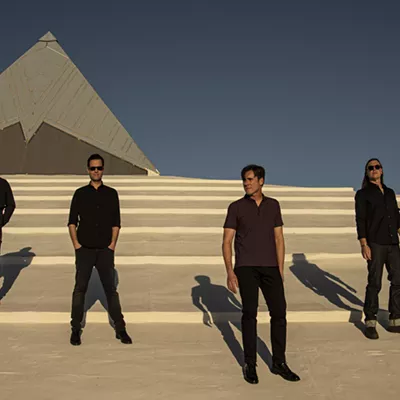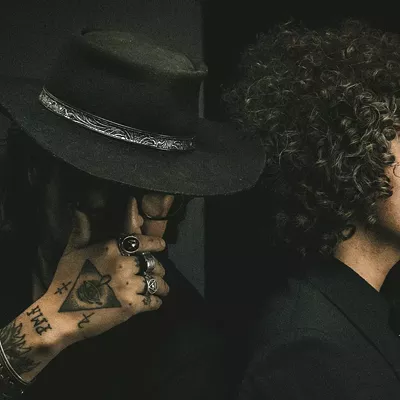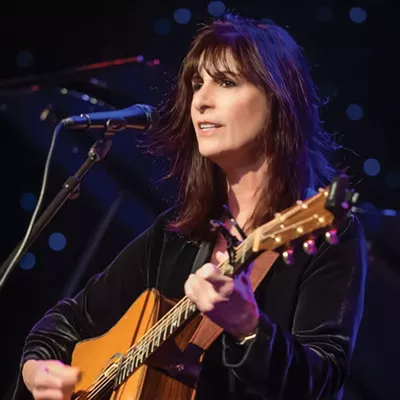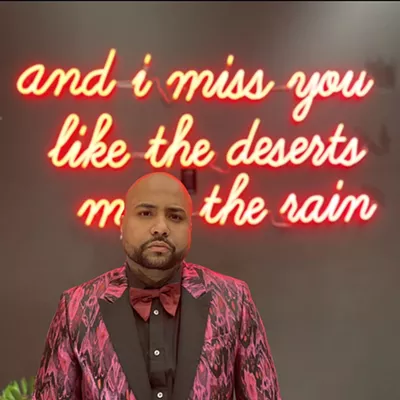Just as Tucson hip-hop has evolved over the last two decades, so too has Big Meridox, who has endured as the most visible, most respected and most accomplished MC here.
With an imminent move to Indianapolis (where, surprise, he got a higher-paying teaching gig) Meridox is wrapping up his long-running While You Slept show, curating a lineup that goes back to his roots in the Tucson hip-hop scene. And, like he's done so many times before, Meridox is representing Tucson in the early slot for a major touring show, supporting DJ Quik and Scarface on Aug. 22.
Reflective on his early years and carrying more passion for his currently in-progress album than anything he's done yet, Meridox is an artist who knows his roots and never stops striving.
"I'm at a crossroads now. My music has evolved. It's gotten a lot more ... reality based about what's in my life and what I need to do," Meridox says. "I have a 19-year-old daughter, and I'm a teacher. I need to teach kids to evolve to the next level, so I've had to become that role model. You have to start with knowledge. I don't even call it rapping any more. I call it teaching. I'm a teacher, and I'm a poet in that same sense. Never once have I dumbed down my music."
Meridox moved to Tucson from Philadelphia at 13 and recalls the 1990s rivalry between East Coast and West Coast rap playing out in the Old Pueblo as well. At Tucson High, he was an outsider, feeling a kinship with the East Coast artists while the other kids listened to West Coast rap. He'd drive a brown Toyota Corolla with Dayton wire rims and get into a bit of trouble. And from that rose his first dabbling with rapping on his own.
"I remember that stuff because it was pivotal. A lot of people didn't like us, but we were getting into rap seriously," he says.
"People come to me when they need a Tucson hip-hop history lesson. You've got to know where hip-hop in Tucson came from before you know where it's going," Meridox says. "I give respect to all those cats who know that. I'm happy to be in Tucson and see that happen. I'll go into a bar and see MCs giving me respect and that makes me feel good because I know they'll hold it down while I'm gone. You got to know your history before you become the star."
The first real group he joined was Red Dirt Specimens, with James Ciphurphace, Lee Hybrid and Scripts G.O.D. Meridox was the one appointed to take the group's bedroom demo tapes downtown and try to get shows. But it was a far different era when hip-hop couldn't break in at the bigger clubs. "Congress was not having it. They wouldn't even call us back," Meridox says.
Red Dirt Specimens performed its first show in 1997 in the basement of the old Double Zero, with a small scene centering there, the Plaza Pub and on freestyle battles during Downtown Saturday Nights. "I'd jump into the middle of a battle with anyone," Meridox says. "But after that, you start getting hungry and you want shows."
The group won a TAMMY award and became the first rap group to perform at Club Crawl but broke up soon after. Next, Meridox performed with Lee Hybrid as The Greys, which helped push him more toward his own style.
Then in 2007 came what Meridox calls "the burrito incident." He got sick after a late night carne asada run, but after a couple days he kept getting worse and ended up at the hospital. Doctors discovered the meat in the burrito had also concealed a roughly two-inch piece of wire, which had perforated his stomach and nearly damaged his liver. Meridox still has it at home.
"I almost died. It was a revelation. Right then and there in the hospital I just said I'm going to do this for myself," he says.
Rededicated to music, Meridox found his voice as a solo artist and in 2008 released his debut, Gimme Your Lunch Money: The Block Bully Album. He'd started bouncing at downtown clubs, Heart Five and Sport's on Congress, and his dense rhymes were full of attitude.
"It was just me being angry. That's all it was about, beating people up. I got a reputation, a Wyatt Earp reputation if you will," he says.
That span of time that coincided with another resurgence of hip-hop downtown, with DJs Bonus and Herm drawing big crowds, new rappers emerging and the also-now-defunct Vaudeville becoming the center of the scene.
If Not the Best at Least a Beast followed, an album based around its cover art, a drawing of Meridox tearing the skin from his face. "It was a darker album. I was still in my dark demon days back then. The art represented me pulling my skin back and letting the demons out," he says.
"I did shows on that album and then the Rialto started calling me. Any time one of those East Coast shows came up, you knew you had to put Ox on it," he says. "There were so many shows I opened, but what gave me my local fame was the Lauryn Hill show. It was so phenomenal. She's a different vibe, but she had visited my page and said 'Yes, that's the hip-hop I want to open my show.' That was an experience of a lifetime."
Also in 2012, Knuckle Rap marked the last of the "beat you up" phase for Meridox. He found a great collaborator in producer Gunky Knuckles, but the duo rushed to put the album out and could've done more, Meridox says. After that, he worked with producer RA Stone on the 7th Division EP.
"That's my favorite album to date. It was so smooth it was a different Ox. I'd let go of my anger. I mellowed it out because that's what was going on in my life and at work. That's where I decided to chill out," he says.
His latest project, Street Elijah, is nearing completion and continues the smooth sound, written while his father was dying of cancer.
"This album is not about anger. It's just about life," he says. "My father would go out and just talk to people. He would put a good message on people's hearts and I wanted to pay homage. He had a lot of old '70s records, so I sampled them. He was smooth. Everybody who knew him knew he was smooth. He never got upset. He told me to let stuff go, and that's what I've been doing. It's not sad, but there are undertones of him in there."
The lesson from his father that resonates strongest now is to make the most of life's opportunities.
"He told me you've got to take risks and go. That's why leaving Tucson is so hard. I can hear him saying 'Go,'" he says.
"You want to leave on a good note, on a powerful note. What I've done in this town, I hope, is make hip-hop grow," he says. "I want to challenge people's minds with my music. That's what this farewell is. It's not good-bye. I'm challenging all these rappers to keep coming with new ideas."













